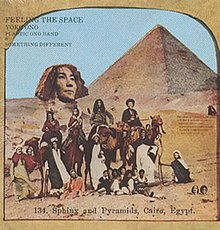Feeling the Space
| Feeling the Space | ||||
|---|---|---|---|---|
 |
||||
| Studio album by Yoko Ono/The Plastic Ono Band | ||||
| Released | November 23, 1973 | |||
| Recorded | 1972–June 1973 | |||
| Genre | ||||
| Label | Apple | |||
| Producer | John Lennon, Yoko Ono | |||
| Yoko Ono/The Plastic Ono Band chronology | ||||
|
||||
| Singles from Feeling the Space | ||||
|
||||
| Professional ratings | |
|---|---|
| Review scores | |
| Source | Rating |
| Allmusic |
|
| Rolling Stone | (not rated) |
Feeling the Space is Yoko Ono's fourth solo album, her last one on Apple Records and her last release of the 1970s. (A fifth album, A Story, would be recorded in 1974, but not released until 1997).
The entire album adopts a feminist theme, focusing on the plights of women in the 1970s. Its liner notes parody adult advertising, giving the telephone numbers, birthdates and vital statistics of the male band members. (John Lennon appears as "John O'Cean", with his number listed as "Not for Sale"). Lennon played guitar on the tracks "Woman Power" and "She Hits Back", and sing a backing vocal line on "Men, Men, Men". Lennon's album, Mind Games, was released around the same time as Feeling the Space, in November 1973.
The album was originally planned to be a double until EMI/Apple demanded it be edited; two of the songs excised from the double were issued as singles in Japan. The entire released album, plus the songs originally intended for the double release, is included as the "Run, Run, Run" disc on the "Onobox" set.
All songs written by Yoko Ono.
...
Wikipedia
